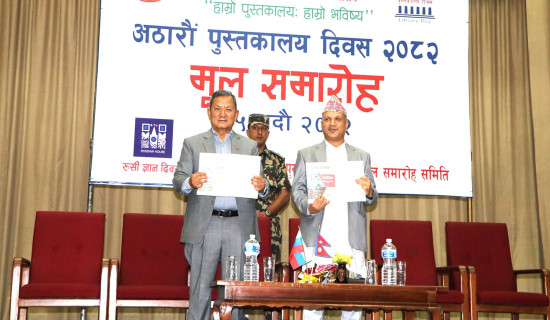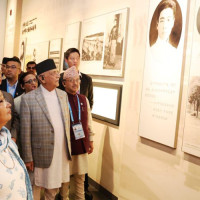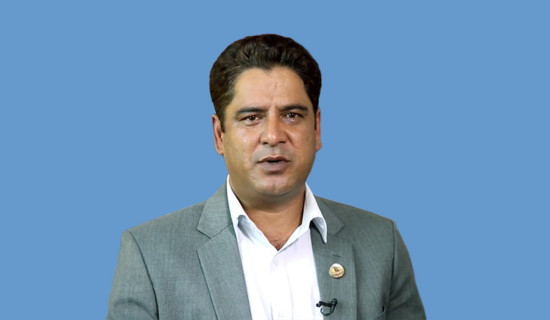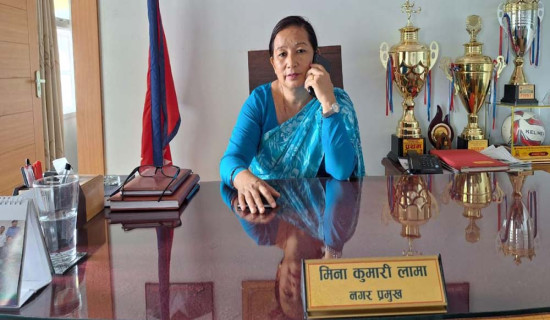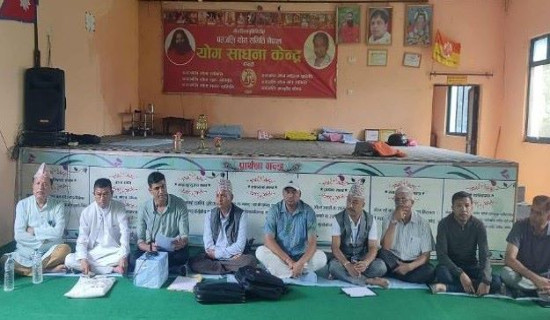- Sunday, 31 August 2025
If not weapons, what we should give the police: Minister Lekhak
By A Staff Reporter,Kathmandu, July 19: Minister for Home Affairs Ramesh Lekhak has said that the procurement of arms for Nepal Police and the Armed Police Force (APF) Nepal is being carried out in accordance with legal procedures and within the limits of the allocated budget.
Addressing a meeting of the Federalism Enablement and National Concerns Committee under the National Assembly on Friday, Minister Lekhak emphasised that the government has prioritised purchasing only the essential weapons needed for the law enforcement agencies.
"Provisions have been made in this fiscal year’s budget to initiate the procurement process," he said. "There should be no confusion that the weapons will be acquired transparently and in full compliance with the law, strictly within the scope of the allocated budget," he said.
Rejecting allegations regarding the revival of old tenders for weapon purchases, Minister Lekhak clarified, "Tenders issued three or four years ago have not been extended or reactivated. The current procurement is based on fresh processes as per existing legal frameworks."
Responding to concerns raised by lawmakers and recent media reports, he questioned the logic behind opposing arms procurement for police forces. “If we only build physical infrastructure and fail to equip our police, that creates a new problem altogether. Just as teachers need chalk and dusters, and students require books and notebooks, police forces need weapons. What else are we supposed to provide them?” he remarked rhetorically.
He further justified the necessity of arms, stating, “In the border areas, officers often face armed criminals. If word spreads that our police are unarmed, it could pose serious security risks. We intend to procure necessary equipment, not excessive weaponry.”
Procurement conducts lawfully: IGP Thapa
Likewise, Inspector General of Nepal Police Deepak Thapa and Inspector General of the Armed Police Force Raju Aryal also addressed lawmakers' queries, affirming that all arms procurement activities are being conducted lawfully.
IGP Thapa explicitly claimed that the Ministry of Home Affairs had issued no unauthorised instructions regarding arms purchases. "This is not a matter of arbitrary directives; it is a structured process guided by laws, regulations, and acts approved by Parliament," he explained.
Refuting claims of reviving defunct arms tenders, Thapa clarified that current procurement is based on budget allocations outlined in the red book and includes prioritised items. “We require non-lethal weapons such as tear gas shells, rubber bullets, and barricade vehicles, all within the fixed ceiling,” he said.
Thapa also disclosed that the government has already approved Rs. 5 billion for the construction of police infrastructure, and tender processes have been initiated for 56 new buildings.
Both security chiefs emphasised their commitment to transparency, accountability, and continuous improvement in response to parliamentary concerns.
APF chief highlights border security needs
Speaking on behalf of the Armed Police Force, IGP Aryal underscored the necessity of arms procurement to bolster border security, curb smuggling and address staffing shortages.
“To strengthen border security, we require advanced technology, a strong legal framework, and adequate manpower,” IGP Aryal said. While 425 Border Outposts (BOPs) have been established nationwide, only 37,000 personnel are currently deployed against 60,000 a required personnel, he informed the committee.
Aryal stressed the need for legal amendments and technological advancements to combat cross-border drug trafficking and smuggling.
“We have already started implementing record-keeping systems at border posts. With expanded resources and improved technology, we aim to streamline and enhance border operations.”
He also raised concerns about declining morale among personnel due to lack of pension provisions and urged the state to adopt policies that incentivise those serving around the clock in national security roles.
While acknowledging isolated instances of individual involvement in smuggling, Aryal firmly denied the existence of any institutional nexus, assuring the lawmakers that actions are being taken against all involved.



-original-thumb.jpg)


